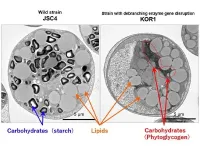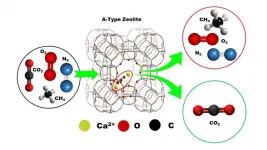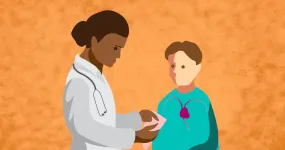INFORMATION:
Aluminum may affect climate change by increasing ocean's carbon sink capacity
2021-05-06
(Press-News.org) Reducing net greenhouse gas emissions to zero as soon as possible and achieving "carbon neutrality" is the key to addressing global warming and climate change. The ocean is the largest active carbon pool on the planet, with huge potential to help achieve negative emissions by serving as a carbon sink.
Recently, researchers found that adding a small amount of aluminum to achieve concentrations in the 10x nanomolar (nM) range can increase the net fixation of CO2 by marine diatoms and decrease their decomposition, thus improving the ocean's ability to absorb CO2 and sequester carbon at deep ocean depths.
The study, published in Limnology and Oceanography on May 3, was conducted by a joint team led by Prof. TAN Yehui from the South China Sea Institute of Oceanology (SCSIO) of the Chinese Academy of Sciences and Prof. Peter G.C. Campbell from the Eau Terre Environnement Research Centre of the National Institute of Scientific Research, Canada.
According to the earlier "iron hypothesis", adding a small amount of iron to the iron-limited but nutrient-rich oceans could significantly promote the growth of marine phytoplankton (microalgae) and their absorption of CO2, and the consequent burial of organic matter in the ocean. However, the results of artificial iron fertilization experiments did not fully support the "iron hypothesis" and later studies suggested that ignoring the effects of aluminum and other elements may be the reason.
"In fact, natural iron fertilization, as caused by dust deposition, upwelling and hydrothermal venting, provides the ocean not only iron, but also aluminum and other elements. Aluminum concentrations in the upper ocean are usually one order of magnitude higher than those of iron," said Prof. TAN.
Prof. TAN's team and their collaborators found that aluminum may not only improve the utilization efficiency of iron and dissolved organic phosphorus by marine phytoplankton, thus enhancing carbon fixation in the upper ocean, but may also reduce the decomposition rate of biogenic organic carbon and enhance the export and sequestration of carbon in deep ocean depths.
They also found a significant negative correlation between aluminum input to the Southern Ocean and atmospheric CO2 concentration over the past 160,000 years.
Based on their findings about aluminum, they improved the original "iron hypothesis" by proposing the "iron-aluminum hypothesis" to better explain the roles of the two elements in climate change.
In this study, the researchers used radiocarbon (14C) as a tracer to show that adding aluminum to seawater to achieve trace concentrations (e.g., 40 nM) increased net carbon fixation of marine diatoms 10% to 30%.
More importantly, this study proved that environmentally relevant low concentrations of aluminum can reduce the daily decomposition rate of marine diatom-produced particulate organic carbon by 50% or more.
Calculations based on the new data suggest that adding aluminum at a concentration of 40 nM or lower to the ocean may increase the amount of particulate organic carbon exported to depths of 1,000 m and deeper by 1-3 orders of magnitude. This will significantly increase the ocean's carbon sink capacity and sequester carbon in the ocean for a long time, thus ameliorating climate change.
ELSE PRESS RELEASES FROM THIS DATE:
Low achieving students benefit most from COVID-19 online switch
2021-05-06
Students struggling academically benefited most when schools around the world transitioned from classroom teaching to online learning in response to the COVID-19 pandemic, and the switch also didn't negatively impact higher achievers.
A new study has analysed the impact of online learning during the pandemic by crunching data at three middle schools in China, which administered different educational practices for about 7 weeks during the country's Covid-19 lockdown.
Online learning was shown to have a positive impact on overall student performance when compared to not receiving any support from school during lockdown, and the best results were achieved by ...
Worth 1000 words: How the world saw Australia's black summer
2021-05-06
Australia's 'black summer' of bushfires was depicted on the front pages of the world's media with images of wildlife and habitat destruction, caused by climate change, while in Australia the toll on ordinary people remained the visual front-page focus.
QUT visual communication researcher Dr TJ Thomson compared the front-page bushfire imagery of the Sydney Morning Herald over three months from November 10, 2019 to January 31 2020 with 119 front pages from international media from the start of January, when the world sat up and took notice, to January 31.
"The international sample of front pages included the Americas and Europe (about 90 per cent) representing Australia's 'black summer'. Asia represented around 7 per cent of the international ...
First nanoscale look at a reaction that limits the efficiency of generating hydrogen fuel
2021-05-06
Transitioning from fossil fuels to a clean hydrogen economy will require cheaper and more efficient ways to use renewable sources of electricity to break water into hydrogen and oxygen.
But a key step in that process, known as the oxygen evolution reaction or OER, has proven to be a bottleneck. Today it's only about 75% efficient, and the precious metal catalysts used to accelerate the reaction, like platinum and iridium, are rare and expensive.
Now an international team led by scientists at Stanford University and the Department of Energy's SLAC National Accelerator Laboratory has developed a ...
Microalgae biofuels: Changing carbohydrates into lipids
2021-05-06
A cross-institutional collaboration has developed a technique to repartition carbon resources from carbohydrates to lipids in microalgae. It is hoped that this method can be applied to biofuel production. This discovery was the result of a collaboration between a research group at Kobe University's Engineering Biology Research Center consisting of Project Assistant Professor KATO Yuichi and Professor HASUNUMA Tomohisa et al., and Senior Researcher SATOH Katsuya et al. at the Takasaki Advanced Radiation Research Institute of the Quantum Beam Science Research Directorate ...
WHO 'needs to act' on suicides caused by pesticides
2021-05-06
Scientists are calling for more stringent pesticide bans to lower deaths caused by deliberately ingesting toxic agricultural chemicals, which account for one fifth of global suicides.
A NHMRC funded study, in which the University of South Australia analysed the patient plasma pesticide concentrations, has identified discrepancies in World Health Organization (WHO) classifications of pesticide hazards that are based on animal doses rather than human data.
As a result, up to five potentially lethal pesticides are still being used in developing countries in the Asia Pacific, where self-poisonings account for up to two thirds of suicides.
In ...
Epilepsy research reveals why sleep increases risk of sudden death
2021-05-06
New research from the University of Virginia School of Medicine reveals why sleep can put people with epilepsy at increased risk of sudden death.
Both sleep and seizures work together to slow the heart rate, the researchers found. Seizures also disrupt the body's natural regulation of sleep-related changes. Together, in some instances, this can prove deadly, causing Sudden Unexpected Death in Epilepsy, or SUDEP.
"We have been trying to better understand the cardiac changes around the time of a seizure in patients with epilepsy. When we looked ...
Novel tool could fast-track cell discoveries
2021-05-06
Proteins are the workhorses of cells, responsible for almost all biological functions that make life possible.
Understanding how specific proteins work is key to disease prevention and treatment, allowing us to lead longer, healthier lives.
Yet scientists still know nothing or very little about thousands of proteins that exist in our bodies and their role in keeping us alive.
Now researchers from Xi'an Jiaotong-Liverpool University have uncovered a new protein analysis tool - coined the Bacterial Growth Inhibition Screen (BGIS) - that could fast-track the process of assessing proteins. The tool allows for quick and efficient basic characterisation of protein function with no special equipment or cost involved.
Dr Ferdinand Kappes of XJTLU's ...
Zero to hero: Overlooked material could help reduce our carbon footprint
2021-05-06
It is now well known that carbon dioxide is the biggest contributor to climate change and originates primarily from burning of fossil fuels. While there are ongoing efforts around the world to end our dependence on fossil fuels as energy sources, the promise of green energy still lies in the future. Can something be done in the meantime to reduce the concentrations of CO2 in the atmosphere?
It would, in fact, be great if the CO2 in the atmosphere could simply be adsorbed! Turns out, this is exactly what direct air capture (DAC), or the capture of CO2 under ambient conditions, aims to do. However, no such material with the ability to adsorb CO2 efficiently under DAC ...
Alzheimer's study: A Mediterranean diet might protect against memory loss and dementia
2021-05-06
In Alzheimer's disease, neurons in the brain die. Largely responsible for the death of neurons are certain protein deposits in the brains of affected individuals: So-called beta-amyloid proteins, which form clumps (plaques) between neurons, and tau proteins, which stick together the inside of neurons. The causes of these deposits are as yet unclear. In addition, a rapidly progressive atrophy, i.e. a shrinking of the brain volume, can be observed in affected persons. Alzheimer's symptoms such as memory loss, disorientation, agitation and challenging behavior are the consequences.
Scientists at the DZNE led by Prof. Michael Wagner, head of a research group at the DZNE and senior ...
Researchers develop better way to determine safe drug doses for children
2021-05-06
Determining safe yet effective drug dosages for children is an ongoing challenge for pharmaceutical companies and medical doctors alike. A new drug is usually first tested on adults, and results from these trials are used to select doses for pediatric trials. The underlying assumption is typically that children are like adults, just smaller, which often holds true, but may also overlook differences that arise from the fact that children's organs are still developing.
Compounding the problem, pediatric trials don't always shed light on other differences that can affect recommendations for drug doses. There are many factors that limit children's participation in drug trials - for instance, some diseases simply ...






